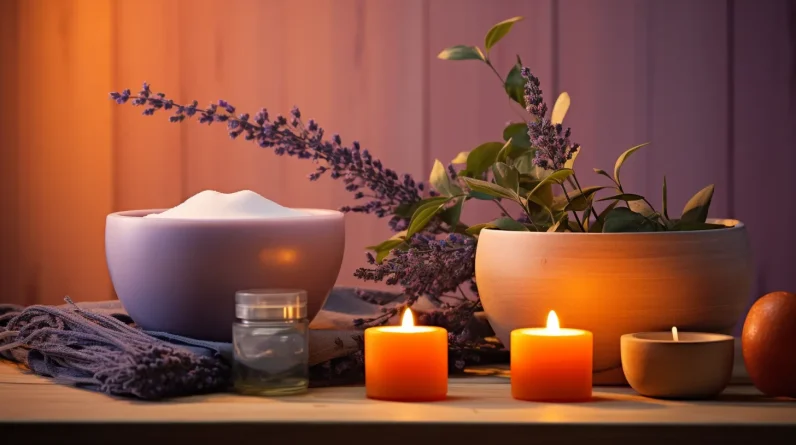
Step into a world where the scent of wellbeing permeates the air, guiding you on a journey toward holistic healing.
Aromatherapy, a practice rooted in ancient wisdom, harnesses the power of essential oils to promote physical, emotional, and spiritual balance. In this enlightening article, we delve into the history, science, and healing properties of aromatherapy.
Join us as we explore the art of creating a personalized aromatherapy routine and discover the transformative techniques of holistic healing.
Embark on a path to wellness, where freedom and serenity await.
Key Takeaways
– Aromatherapy has a long history and is rooted in ancient civilizations such as Egypt, Greece, and China.
– Essential oils have various healing properties, including promoting relaxation, reducing stress, and possessing antibacterial and anti-inflammatory properties.
– Aromatherapy can be applied through inhalation, topical application, bathing, massage, and compresses.
– Holistic healing techniques such as acupuncture, reiki, meditation, yoga, and crystal healing can complement aromatherapy for overall wellbeing.
The History of Aromatherapy and Holistic Healing
One cannot fully understand the practice of aromatherapy and holistic healing without delving into its rich historical roots. The origins of aromatherapy can be traced back thousands of years to ancient civilizations such as Egypt, Greece, and China. These cultures recognized the power of scent and used aromatic plants and oils for their healing properties. Aromatherapy was not just seen as a physical remedy, but also as a means to balance the mind, body, and spirit.
In ancient Egypt, for example, essential oils were used in religious ceremonies, cosmetics, and even in the embalming process. The Greeks also embraced aromatherapy, with Hippocrates, the father of modern medicine, using aromatic plants to treat various ailments. In China, aromatherapy was linked to the principles of Traditional Chinese Medicine, where specific scents were believed to have the ability to restore balance and harmony within the body.
The cultural significance of aromatherapy and holistic healing extends beyond the ancient world. Indigenous cultures around the world have long used aromatic plants in their healing rituals and ceremonies. These practices have been passed down through generations, preserving the wisdom of nature and the healing power of plants.
Today, aromatherapy continues to impact mental health and emotional wellbeing. Studies have shown that certain scents can have a profound effect on our mood, helping to reduce stress, anxiety, and depression. Lavender, for example, is known for its calming properties, while citrus scents can help to uplift and invigorate the mind. Aromatherapy offers a holistic approach to healing, addressing not only physical ailments but also promoting emotional and mental wellbeing.
Understanding the Science Behind Aromatherapy
To truly grasp the effectiveness and mechanisms of aromatherapy, one must delve into the scientific principles that underlie this holistic healing practice. Aromatherapy harnesses the power of essential oils to promote physical, emotional, and mental well-being. The impact of scent on emotions is a key aspect of aromatherapy. When we inhale an aroma, it stimulates the olfactory system, which is directly connected to the brain’s limbic system. This part of the brain controls emotions, memories, and behaviors. As a result, certain scents can evoke specific emotions and trigger physiological responses.
The physiological effects of aromatherapy are also significant. Essential oils have chemical components that can interact with the body in various ways. For instance, they can affect hormone production, blood pressure, heart rate, and immune function. Different oils have different properties, such as calming, energizing, or pain-relieving effects. Lavender, for example, is known for its calming properties and can help reduce anxiety and promote relaxation. Peppermint, on the other hand, is invigorating and can help improve focus and mental clarity.
Understanding the science behind aromatherapy allows us to make informed choices about the oils we use and how we use them. It emphasizes the importance of using high-quality, pure essential oils to ensure their efficacy and safety. By harnessing the power of scent and its impact on emotions and physiology, aromatherapy offers a holistic approach to healing and well-being.
Essential Oils and Their Healing Properties
The essential oils used in aromatherapy possess a wide range of healing properties that contribute to the overall effectiveness of this holistic healing practice. These oils are derived from various plant sources and contain powerful compounds that can positively impact our physical, mental, and emotional well-being.
One of the key benefits of aromatherapy is its ability to promote relaxation and reduce stress. Essential oils such as lavender, chamomile, and bergamot are known for their calming properties and can help to alleviate anxiety and improve sleep quality. On the other hand, oils like peppermint and rosemary have invigorating effects and can boost energy levels and improve focus and concentration.
In addition to their psychological effects, essential oils also possess potent antibacterial, antiviral, and anti-inflammatory properties. For example, tea tree oil is often used to treat acne and fungal infections, while eucalyptus oil is known for its ability to relieve respiratory conditions such as coughs and congestion.
To enhance the therapeutic benefits of aromatherapy, essential oil blends are often created by combining different oils that complement and enhance each other’s properties. These blends can be customized based on individual needs and preferences. Whether you’re looking to relax, uplift your mood, or treat a specific ailment, there is an essential oil blend that can support your goals.
Creating a Personalized Aromatherapy Routine
As individuals embark on their aromatherapy journey, they can personalize their routine by selecting essential oils and blends that align with their specific needs and goals. Aromatherapy benefits are vast and diverse, catering to various aspects of our well-being – physical, mental, and emotional.
To create a personalized aromatherapy routine, individuals can follow these techniques:
Identify your goals: Determine what you aim to achieve through aromatherapy. Whether it’s relaxation, stress relief, improved sleep, or mental clarity, understanding your goals will help you select the most suitable essential oils.
Consider your preferences: Explore different aromas and find scents that resonate with you. Each essential oil has its unique properties and fragrance, and by selecting oils that you enjoy, you enhance the overall experience and effectiveness of aromatherapy.
Experiment and blend: Don’t be afraid to mix and match different essential oils to create your customized blend. Combining oils can amplify their benefits and create a personalized aroma that uplifts your spirit and promotes a sense of freedom.
Exploring Different Techniques of Holistic Healing
Several techniques, such as acupuncture, meditation, and energy healing, can be explored to embrace the principles of holistic healing and enhance overall well-being. Alternative therapies have gained popularity in recent years as individuals seek natural and holistic approaches to their health and well-being.
Acupuncture, for instance, is an ancient Chinese practice that involves inserting thin needles into specific points on the body to stimulate energy flow and restore balance. This technique is believed to alleviate pain, reduce stress, and promote healing.
Meditation, on the other hand, is a mindfulness practice that involves focusing one’s attention and achieving a state of deep relaxation. It has been proven to reduce anxiety, improve mental clarity, and enhance emotional well-being. By quieting the mind and connecting with one’s inner self, meditation allows individuals to tap into their own inner wisdom and gain a deeper understanding of themselves.
Energy healing is another technique that is gaining recognition in the field of holistic healing. It involves working with the body’s energy fields to promote physical, emotional, and spiritual well-being. Practitioners use various methods, such as Reiki, qigong, and Healing Touch, to channel and balance energy in the body, thereby promoting healing and restoring harmony.
These alternative therapies offer individuals the opportunity to take an active role in their own healing process. By exploring different techniques of holistic healing, individuals can tap into their body’s natural ability to heal and experience a greater sense of well-being.
Frequently Asked Questions (FAQs)
What Are the Potential Side Effects or Risks of Using Essential Oils in Aromatherapy?
Potential side effects and risks of using essential oils in aromatherapy include allergic reactions and skin irritation. It is important to conduct a patch test before using essential oils and to consult with a qualified aromatherapist to ensure safe and effective use.
Can Aromatherapy Be Used as a Standalone Treatment for Serious Medical Conditions?
Aromatherapy, as an alternative therapy, is not typically used as a standalone treatment for serious medical conditions. Its efficacy in addressing such conditions is limited, and it is often recommended as a complementary approach to conventional medicine.
How Long Does It Usually Take to Experience the Benefits of Aromatherapy?
The timeframe for experiencing the benefits of aromatherapy varies depending on the individual and the specific condition being addressed. Some individuals may notice effects immediately, while for others it may take several sessions to fully feel the benefits.
Are There Any Specific Essential Oils That Should Be Avoided During Pregnancy or While Breastfeeding?
During pregnancy or while breastfeeding, it is important to exercise caution when using essential oils. Some oils should be avoided altogether, while others can be used safely with proper dilution and under the guidance of a qualified professional.
Is It Safe to Use Essential Oils Directly on the Skin, or Should They Always Be Diluted With a Carrier Oil?
Using essential oils undiluted on the skin can pose risks such as irritation or sensitization. Diluting them with a carrier oil helps to mitigate these risks and allows for better absorption. The best carrier oils to use with essential oils include jojoba, coconut, and almond oil.
Conclusion
In conclusion, aromatherapy and holistic healing have a rich history and scientific basis that support their effectiveness in promoting wellbeing. Essential oils, with their unique healing properties, offer a natural and personalized approach to improving physical and mental health.
By exploring different techniques of holistic healing, individuals can cultivate a sense of balance and harmony in their lives. Embracing the scent of wellbeing, we can embark on a journey of holistic healing that transcends time and connects us to our inner selves.







